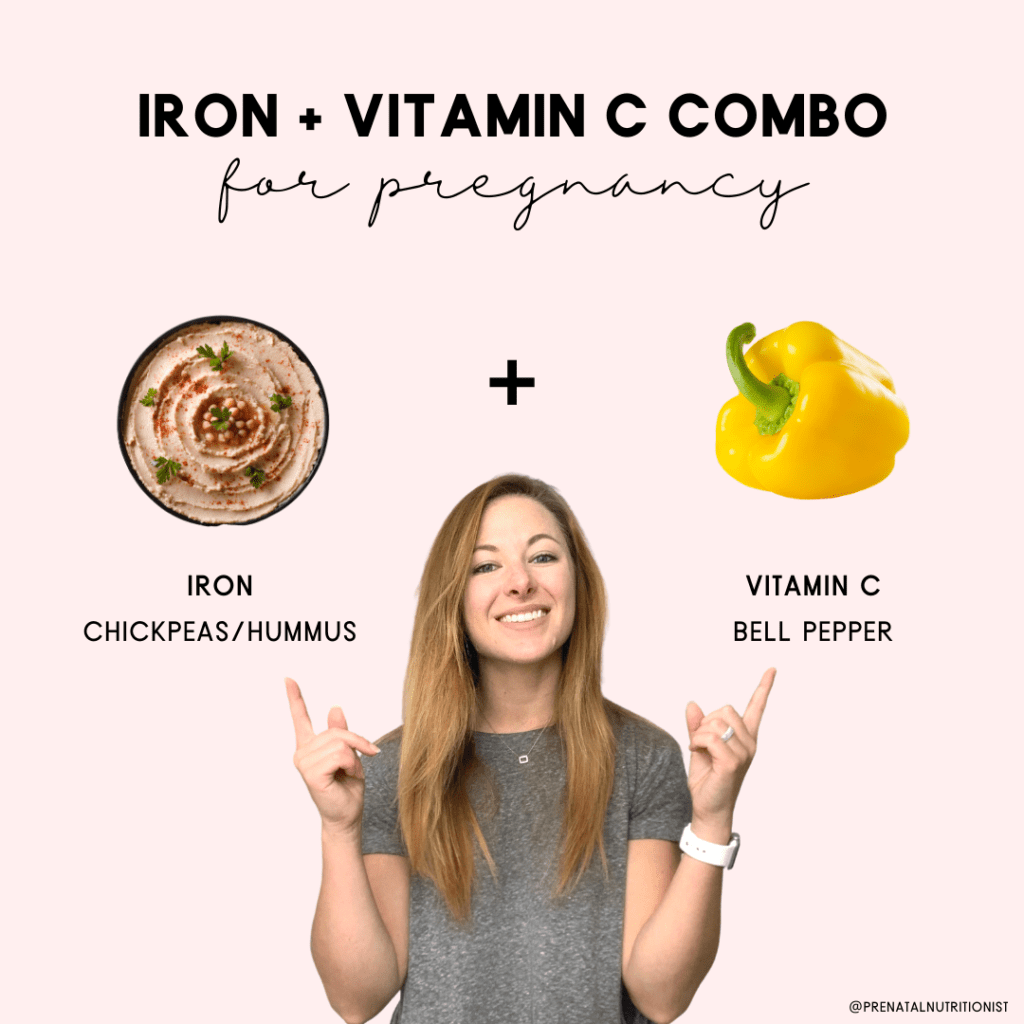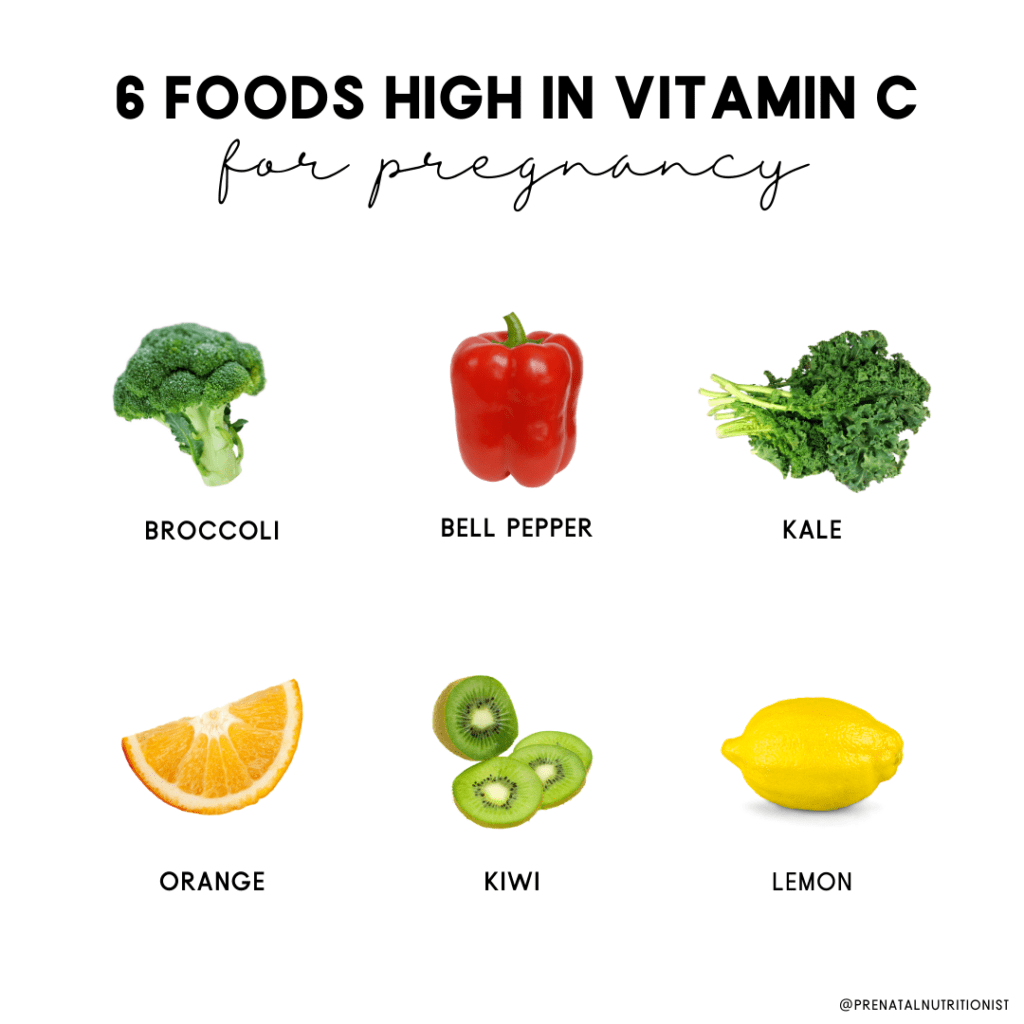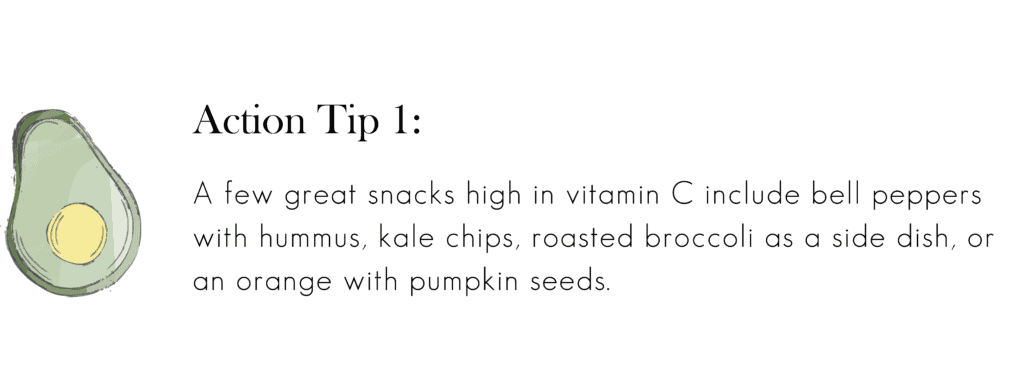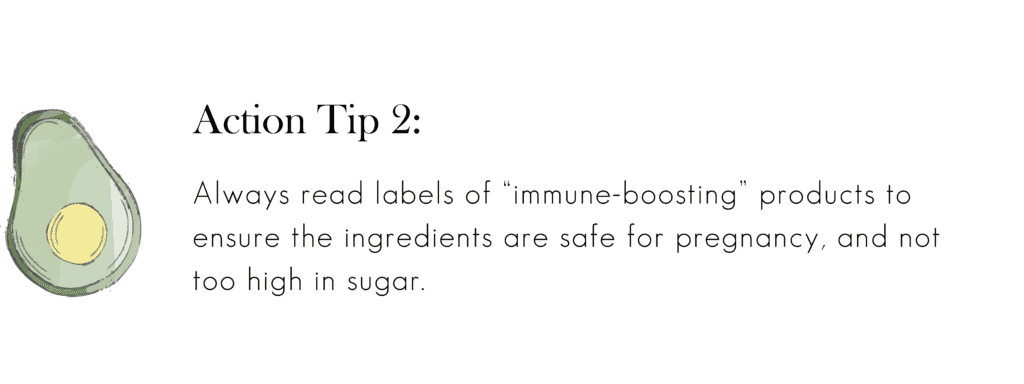What is Vitamin C?
Vitamin C is a water-soluble vitamin that must be consumed from our diet since the body can’t make it or store it (10).
It’s an antioxidant that is often referred to as ascorbic acid. It’s important for immune function, collagen synthesis, skin health, bone health, and blood vessel function/blood pressure.
Why is Vitamin C important for pregnancy?
Due to inadequate intake, typically it gets harder to enjoy fruits and veggies, and physiological changes during pregnancy, vitamin C levels decrease so it is important to try your best to consume it on a regular basis.
Vitamin C is important to keep your immune system functioning in order to prevent you from getting sick during pregnancy (4, 6).
Vitamin C and Birth Weight + Length
Several studies from South Korea have linked both vitamin C and vitamin E (both antioxidants) to positive birth weight and length outcomes (1, 2). They specifically mention serum levels of vitamin C in the second trimester of pregnancy were predictive of birth weight and length.
It’s clear the more fruits and vegetables you eat during pregnancy (for both these nutrients & more) the better!
Vitamin C and Type 1 Diabetes
In a study with pregnant women who had type 1 diabetes, low vitamin C levels showed to be more problematic (5).
The researchers showed that inadequate vitamin C levels within 4 weeks of delivery were associated with a greater risk of pregnancy complications such as prematurity, pregnancy-induced hypertension, preeclampsia, fetal malformations, placental abruption, and stillbirth (5).
Again, these results were found in pregnant women with type 1 diabetes, and the number of participants was relatively small, but it is a good idea to up your intake of vitamin C in later stages of pregnancy.
Vitamin C and Iron
Vitamin C also helps our bodies absorb iron better (3), this partnership cannot be understated during pregnancy.
Calcium can interfere with iron absorption (7), but studies have shown that in humans this inhibition only lasts for a short while and typically doesn’t interfere substantially over a lifetime.
To aid your iron absorption, have your high-iron foods with vegetables and fruits, and don’t eat your high calcium foods with your high-iron foods since these two nutrients compete for absorption.
See some high iron + vitamin C combos below.



Where do we find it?
- Red/yellow bell peppers (10 strips = 95 mg)
- Kale
- Broccoli (1 cup chopped, raw = 81 mg)
- Brussels Sprouts
- Cauliflower
- Kiwi
- Oranges (1 small = 51 mg)
- Lemons
- Strawberries (1 cup whole = 84 mg)

 Where else can I find vitamin C?
Where else can I find vitamin C?
Vitamin C is likely in your prenatal vitamin and is in most generic multivitamins or “immune-boosting” supplements.
Vitamin C is also found in many different commercially available beverages.
One popular one is Emergen-C. One packet of this fizzy drink packs a huge 1000 mg punch of vitamin C! It also has only 35 calories, 8 grams of carbs (6 g of which comes from sugar), as well as small amounts of B vitamins, zinc, calcium, and chromium.
While Emergen-C is safe to use during pregnancy, as you’ll read below, you don’t want to go overboard with supplementation. You’ll also notice these drink packets come with sugar and while it is really not much, it is something to be aware of.
Always check the label of products like Emergen-C to verify exactly what ingredients it includes.
 Can I get too much Vitamin C?
Can I get too much Vitamin C?
Since vitamin C is water-soluble, it is difficult to ingest too much of this vital nutrient.
The National Institutes of Health (NIH) recommend pregnant women consume 85 mg of vitamin C daily, with an upper limit of 2000 mg daily for all adults. So, it is not advised to supplement with more than 2000 mg of vitamin C a day.
The NIH also outlines headaches, cramping, diarrhea, and nausea as side effects of too much vitamin C in one day. There is no concrete scientific evidence for overdoses causing peptic ulcers, or vitamin B12 deficiencies, only anecdotal cases (8).
The Bottom Line
- Vitamin C is essential for immune function and can be found in a variety of fruits and vegetables.
- A review study in 2016 found no ill-effects of pregnant women ingesting vitamin C daily (9), though the amount ingested was not noted.
- If you’re going to supplement with vitamin C, be sure to keep your dosage under 2000 mg daily to prevent unwanted side effects.




